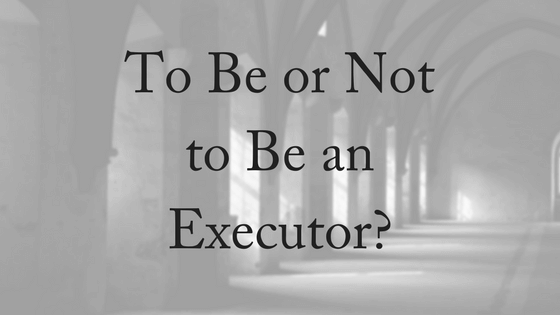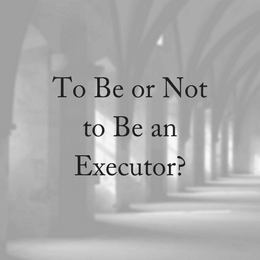
Being the executor of an estate can be a great honour and a great challenge. Choosing the right person is essential for good estate planning and whomever you choose needs to be prepared for the work involved, because being the executor of an estate is not always an easy job.
Sometimes the executor of an estate gets more than they bargained for. This was certainly the case for lawyer Stacy Singer who served as the executor for a woman she had known as an impeccably dressed, well-to-do widow in her 70’s. When it came time to administer the deceased widow’s estate, the elderly woman’s home did not quite match up to the image she presented as a person.
The Wall Street Journal reported that after first crossing the deceased woman’s manicured lawn, Singer opened the door of her home to a surprising sight—papers were stacked floor-to-ceiling, with narrow pathways in between. This would have been enough to make anyone pause and wonder what they’d gotten themselves into. But Singer, as the executor of the estate, needed to soldier on. To effectively administer the estate she hired a team to help to go through the home, and the workers in biohazard suits couldn’t simply throw everything away because valuables might be interspersed amidst the junk. And, indeed, they found $12,000 in cash in 500 otherwise empty potato chip packages that were scattered throughout the home, the newspaper reported. “It looked like she had saved every single piece of paper she had touched for about the last 20 years,” Singer said.
Being the Executor of an Estate is a Job
Douglas Gray, co-author of The Canadian Guide to Will and Estate Planning, said of being an executor that it’s “probably the most stressful experience you’ll ever have.” While sometimes estates can be fairly straightforward, it’s not always the case.
“What I tell all my clients when they take on the job, or when taking their instructions as to who they will appoint as executor, is that this is a job,” says Bryan Mitchell, an Accredited Specialist in Succession Law (Qld).  “The person who takes on this job will have lots of work to do. It is very time-consuming and intensive. You have to be a good record keeper, and your liability is great.” Executors have to be equipped to deal with a myriad of tasks and issues.
“The person who takes on this job will have lots of work to do. It is very time-consuming and intensive. You have to be a good record keeper, and your liability is great.” Executors have to be equipped to deal with a myriad of tasks and issues.
[Tweet “Being the executor of an estate is a job.”]
Family conflict is a common issue that executors have to deal with. This can be because there have always been ingrained family rifts, or simply because the death of a loved one brings with it much angst and emotions are high. When you have to find beneficiaries or paperwork is not in order then the complexity of administering the estate according to the wishes of the deceased can increase.
Some of the other duties of an executor of a will may include:
- making funeral arrangements
- locate the Will and notify all of the beneficiaries
- checking and protecting assets – making sure they are insured
- collect any valuables and income
- pay any debts from the estate and consider any liabilities
- prepare and lodge tax returns
- prepare financial statements
- distributing the estate in accordance with the Will
- bringing and defending any legal proceedings on behalf of the estate
Choosing an Executor
You should make a first choice of persons to be your executors, a second choice and even a third choice. This is important because any executor or executors appointed by you may not be living when you die, may be incapacitated or may simply refuse to act as your executor/s. Although you cannot force someone to become your executor, you need to choose willing people whom you trust, who are sensible and who would wisely seek legal advice about administering your estate.
 Many people choose family members or friends for this role. They need to be over 18 years of age, trustworthy, reliable and capable of carrying out their executor duties. Sometimes it is better to choose someone from outside of your family if you think that there is no-one suitable for the role or it will cause conflict. It is wise to choose an executor who has a fair understanding of financial matters including accounting, taxation matters and business practices. It is a task that can be difficult and time-consuming, so this would certainly be a factor in considering the right person to nominate for this position. An executor who does not complete their obligations may be held personally liable.
Many people choose family members or friends for this role. They need to be over 18 years of age, trustworthy, reliable and capable of carrying out their executor duties. Sometimes it is better to choose someone from outside of your family if you think that there is no-one suitable for the role or it will cause conflict. It is wise to choose an executor who has a fair understanding of financial matters including accounting, taxation matters and business practices. It is a task that can be difficult and time-consuming, so this would certainly be a factor in considering the right person to nominate for this position. An executor who does not complete their obligations may be held personally liable.
When you have identified the right candidate, say experts, don’t make it a surprise. The first thing that you do is ask them whether or not they are agreeable to take on the job, because not everybody is going to be. Even if a person is named as an estate trustee, they are not required to take it on. They can renounce. That is why you should always name at least one alternate in your will.
[Tweet “When you have chosen an executor, don’t let it be a surprise for them.”]
Bryan Mitchell also warns against choosing people with a history of dishonesty or an inability to manage money. He says that lots of people make the mistaken assumption that a person like this will change, but the truth is that they don’t, and the administration of an estate becomes a disaster.
If you’re considering choosing a number of people to be the executor of an estate, make sure you don’t choose people who simply can’t get along. Executors who refuse to work together cost the estate a huge amount of time and money.
Whether you are choosing an executor and planning your will, or you have been appointed as an executor, we can help. At Estate Battles we are experienced in all aspects of estate planning. We offer a free, 10-minute phone consultation. Please contact us today!

